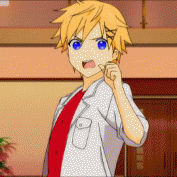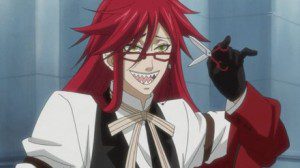Recently, my Twitter feed contained a few questions from friends and associates regarding my opinions of the Winter 2012 anime season entry Inu X Boku SS. Since I have an interest in shows that contain hints of the supernatural, monsters, demons and religion, these people wanted to know my impressions regarding the show, which takes sprinkles of youkai lore and mixes it in with cute girls, overdramatic adults, short skirts and generally tame stories.
 I admit, I hadn’t even known it was coming out. Lately I’ve been watching D. Grayman and Bakemonogatari, two series that proudly mix folklore and drama to great effect, telling tense, serialized tales of love and loss, and personal accountability. Both shows speak to the reasons why I watch such fare, enough that I can ignore the occasionally gratuitous skirt shot, or tsundere schoolgirl. But even from the previews and stills, I could tell that Inu X Boku SS would not be the same type of show.
I admit, I hadn’t even known it was coming out. Lately I’ve been watching D. Grayman and Bakemonogatari, two series that proudly mix folklore and drama to great effect, telling tense, serialized tales of love and loss, and personal accountability. Both shows speak to the reasons why I watch such fare, enough that I can ignore the occasionally gratuitous skirt shot, or tsundere schoolgirl. But even from the previews and stills, I could tell that Inu X Boku SS would not be the same type of show.

Let me start by saying that Inu X Boku contains none of the aforementioned elements. I watched the first four episodes in the past few days, and while there was a decent element of human drama involved, none of it spoke to more moral questions (Bakemonogatari) or featured a great evil doing battle with the forces of good (D. Grayman). What those first four episodes contained was a generally lighthearted tale of a girl named Ririchiyo Shirakiin, who moves into the Ayakashi House apartments, and receives a personal Secret Service Agent in the form of one Soushi Miketsukami. There are typical adjustment issues on Ririchiyo’s part, as she meets the other tenants, and other Secret Service Agents, and has to confront the notion of living alone, while occasionally trying to avoid her overly-protective (though some might argue obsessed) butler…err, agent.
All in all, the show isn’t that much different than others like it. It feels moe at times, and borderline exhibitionist at others. But this isn’t the reason people were asking me my impressions. No, they wanted to know what I thought of the sub-plot, in all its youkai glory.

See, all the people living at Ayakashi House (ayakashi being one of the many Japanese words for “monster” or “demon”) are called Atavists, and are descended from youkai and other monsters. Soushi is part kitsune, a nine-tailed fox known for its immense power. Another agent, Nobara Yukinokouji, is a yuki-onna, or Ice Lady. And one of the tenants, Banri Watanuki, as his name suggests, is a tanuki, or raccoon dog, known for its ability to shape shift. Because these tenants are all part-youkai, the job of the apartment, and the Secret Service Agents, it to keep them safe from full-blooded youkai who might seek to harm them.
Now this idea of part-human youkai isn’t exactly new. Last summer I wrote a review of Nurarihyon no mago, a manga where the protagonist is part youkai trying to retain command over his grandfather’s monster syndicate. But beyond this shared premise, the two series appear to be traveling different roads- Nura is a shounen style action story with epic battles and colorful characters by the boatload. Inu X Boku SS devotes more time to exploring its cast’s motivations and interactions with each other. And on a strictly superficial sense, it can be a satisfying story, full of innuendo and humor, as certain characters overreact and others try to remain serious.
But what struck me the most about Inu X Boku SS is how most of the principle characters in the story are themselves exaggerated versions of characters that exist in other series.

First, let’s look at the two main characters, Ririchiyo and Soushi. Ririchiyo is a serious, often humorless young girl “forced” to live on her own. In order to protect herself, and assist with daily tasks, she had a contract with an agent, Soushi, who swears to serve her every whim, and fight on her behalf. Barring the setting and obvious gender differences, their relationship is a near copy of Ciel Phantomhive and Sebastian Michaelis from Black Butler, right down to the dark clothing and conversations centered around food. Of course Ciel is a bit more serious and cold, and Sebastian is a bit less overbearing/obsessed, but at its core they demonstrate the same type of relationship, with generally the same resolution. Anyone who has read or watched Black Butler might find themselves shaking their head, or drawing up lists of the similarities as the episodes progress.
 Another highly visible character is Nobara the Ice Lady. After watching the first two episodes of IxB SS, I kept picturing in my head the character of Chizuru Honshou from Bleach- a sort of “pervy guy in a woman’s body,” who spends half the series trying to undress other female characters, making disparaging comments about yaoi stories, and professes a desire to have sexual relations with Ririchiyo, whom she constantly refers to as “Chiyo-chan.” While Nobara’s actions are a bit more extreme than Chizuru’s, they are inherently the same type of character, serving the same purpose of comic relief and sexual tension. The only real difference, is that Nobara seems to be a major player in the story.
Another highly visible character is Nobara the Ice Lady. After watching the first two episodes of IxB SS, I kept picturing in my head the character of Chizuru Honshou from Bleach- a sort of “pervy guy in a woman’s body,” who spends half the series trying to undress other female characters, making disparaging comments about yaoi stories, and professes a desire to have sexual relations with Ririchiyo, whom she constantly refers to as “Chiyo-chan.” While Nobara’s actions are a bit more extreme than Chizuru’s, they are inherently the same type of character, serving the same purpose of comic relief and sexual tension. The only real difference, is that Nobara seems to be a major player in the story.

 Finally, there is the strange coupling of Watanuki and Zange, which appears in episode 4. Watanuki screams of a younger, more immature Ichigo Kurosaki (though they appear to be the same age), dressing in a variant on the Soul Reaper captain’s outfit, and constantly looking for a fight, in order to prove himself. Not identical to Ichigo, but eerily reminiscent, a possibly “what-if,” or alternate version of the popular Soul Reaper.
Finally, there is the strange coupling of Watanuki and Zange, which appears in episode 4. Watanuki screams of a younger, more immature Ichigo Kurosaki (though they appear to be the same age), dressing in a variant on the Soul Reaper captain’s outfit, and constantly looking for a fight, in order to prove himself. Not identical to Ichigo, but eerily reminiscent, a possibly “what-if,” or alternate version of the popular Soul Reaper.
But Zange…well, has reddish hair, is seemingly obsessed with Soushi (whom he calls Sou-tan incessantly while fawning on a shoulder), who regards him in a casual way, is overly flamboyant in his personality (especially the bunny ears), and seems thoroughly interested in the random elements of chaos present in the actions of his young charge. In all regards, he’s like a less ambiguous, though equally annoying…well…
 And like the latter, I expect him to be a huge fan favorite.
And like the latter, I expect him to be a huge fan favorite.
All told, I have nothing against Inu X Boku SS. It’s not a bad series by any stretch of the imagination. And if viewers can get past the trope-heavy cast of quasi-clones, the lighthearted story is sure to appeal to that part of you that wants an easy, throwaway series. It makes a great diversion, or a break from more serious youkai-influenced fare. I plan to see this one right to the end.

